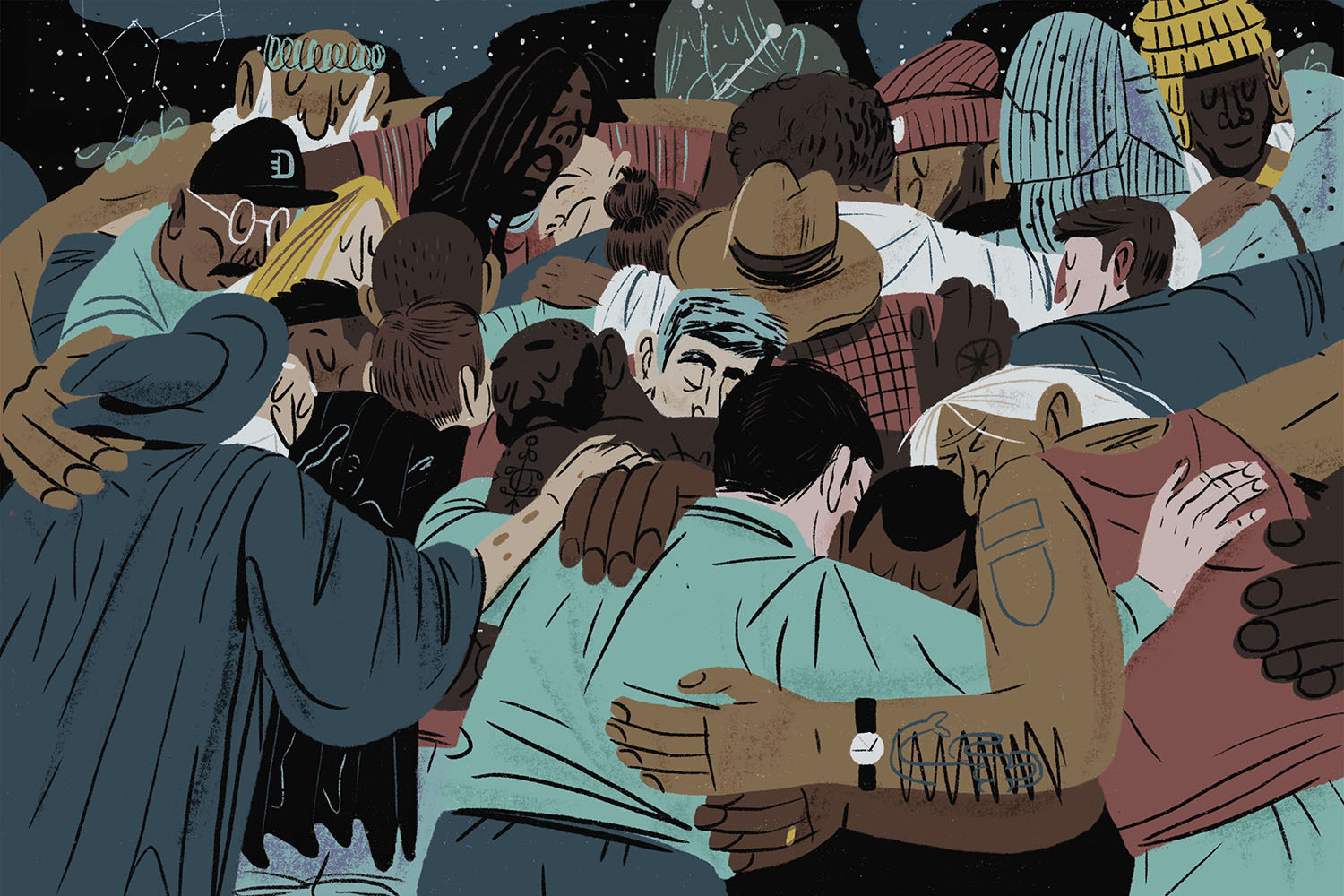Deep into a quarantine binge of the popular reality show Shark Tank, I came up with perhaps the most elaborate and specific insult for all of the emotionally repressed men in my life: “Why don’t you start a small business so you can go on Shark Tank and finally cry?”
All convoluted jabs aside, over the last decade the show has become a surprisingly safe space for men to cry. The first pitch in Shark Tank history back in 2009 came from Tod Wilson of Mr. Tod’s Pie Factory, who teared up while sharing his story of homelessness with the show’s panel of “Sharks” before landing a deal with Barbara Corcoran and Daymond John. Then there was the time Phillip Lapuz, cofounder of the precision golf putter company Kronos, cried about his fiancée in Japan who couldn’t move to the U.S. unless his company became more successful. Robert Herjavec helped Lapuz calm down by offering him a deal. Finally, there was Johnny Georges, the inventor of the Tree T-Pee, a product used to help farmers conserve water. Georges brought himself and nearly everyone else in the room to tears when he admitted that he didn’t want to profit, he just wanted to help farmers. And of course, he walked away with a deal with guest judge John Paul DeJoria.
The success rate of crying on the show would make it seem more like a manipulative move on par with the pitching from child entrepreneurs, if it weren’t for the judges getting in on the action. John and Kevin O’Leary have engaged in a few dignified man-cries over the years, and Herjavec has gotten emotional over factory workers so many times, his catchphrase should be, “And for that reason, I am crying.”
“While it is usually assumed that there is no crying in business, countless men have cried on Shark Tank during a pitch, and the show has now become a safe space for men to cry,” clinical psychologist Holly Schiff tells InsideHook. As much as the show has normalized men crying, research shows that men only cry about five to 17 times a year on average, compared to women, who cry anywhere from 30 to 64 times a year.
According to Schiff, it is the act of being in a pressure cooker with investors that makes men feel more comfortable with letting themselves cry. They’ve already done something so stereotypically masculine by being in the tank in the first place, that it frees them up to deviate from norms like “men don’t don’t have emotions.” They feel like they have less to prove.
“There are certain contexts, circumstances or situations that allow men to cry without being socially penalized,” Schiff explains. To her point, a recent study found that both men and women believed that it was more socially acceptable for male firefighters to cry on the job than it was for male nurses to cry on the job, precisely because fighting fires is seen as a manlier job.
Another prominent example of this Shark Tank effect can be seen in professional sports, among athletes and fans alike. “Men crying may be prominent and publicized in sports precisely because sports are perceived as highly masculine,” Schiff says. “Not only are men more comfortable crying in manlier situations, but they are also given more social leeway.”
However, this is not a blanket permission for men to cry, and there are standards for crying in sports that seem to translate in the tank. For instance, in sports it is more acceptable to cry when you win or at least play well, but when an athlete plays poorly or causes a loss, crying is less tolerated.
Crying in the tank seems similarly results-dependent. When the Sharks doubted the libido-boosting claims of “aphrodisiac bars,” cofounder Michael Gallagher sobbed through a story about his failure to be a firefighter, followed by a health struggle with a brain aneurysm. Although the Sharks offered supportive advice, his tears did not make up for what was lacking in the legitimacy of his product, so he walked away without a deal. The display of emotion cannot compensate for a lack of performance, or as Schiff puts it, “If they did not perform well, and then they aren’t able to regulate their emotions appropriately, it is less accepted and seen more that they are unstable or too emotionally sensitive and hysterical.”
Interestingly, another study showed that athletes who are more accepting of crying typically have higher self-esteem and perform better. In other words, it may not be that men who perform at an elite level in business or athletics are the only ones allowed to cry, but that there is something about expressing emotions that actually helps them perform better. Considering the many benefits of crying — particularly the release of oxytocin and endorphins that can help dull physical and emotional pain — it makes sense why men who cry might be more set up for success.
This idea of using tears as an optimization tool hasn’t been studied, but men don’t need to play sports, go on Shark Tank or be in a hyper-masculine environment to try it out. They just have to make sure that they don’t feel like they have to prove themselves. For men, this can be often achieved by emphasizing more positive traits traditionally associated with masculinity, like self-reliance, acts of service and a sense of humor.
“Living a life of strength, bravery and integrity in other more everyday aspects of life should make men feel more comfortable when they do feel the need to cry,” Schiff adds. Or in the words of Mr. Wonderful himself, there’s nothing proprietary about crying. Any guy can do it.
This article was featured in the InsideHook newsletter. Sign up now.





















